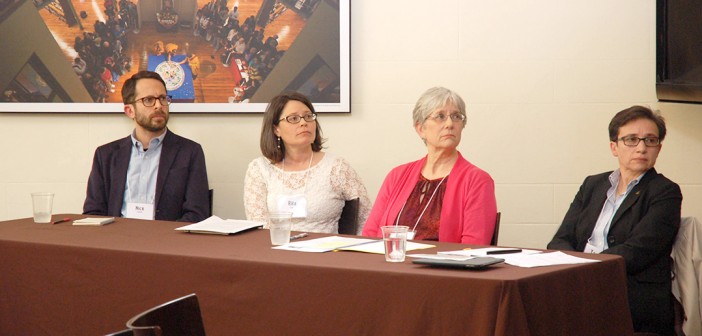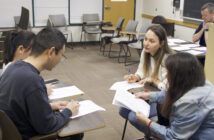Lehigh’s Council for Equity and Community held a panel discussion in the Alumni Memorial Building on March 31 to discuss how to personally address individuals who make contributions to society but may hold different or controversial views.
The Council for Equity and Community is a committee that consists of faculty, staff and students. The panel, run by Christopher Burke, a moderator and faculty representative, featured four Lehigh faculty and staff members who represented different fields: Yasmin Bughaigis, the director of Project Management; Rita Jones, the director of the Women’s Center; Nick Sawacki, an associate professor of Art History; and Nadine Sine, a professor of music history and the chair of the Department of Music.
The panel discussed composer Richard Wagner, a German musician who held anti-Semitic views. Lehigh’s graduation ceremony uses music from composer Richard Wagner. By discussing this and other issues, the panel aimed to promote discussion on whether a person’s accomplishments or achievements should be ignored if someone does not agree with that individual’s personal beliefs.
“Because Wagner’s music produced such a reaction, and because he was vocal in antisemitism, and because there was such rampant antisemitism in the 19th century, Wagner took it and put it in writing,” said Nadine Sine, a professor of music history and the chair of the Department of Music, who was a member of the panel. “He was kind of a despicable person. And if he wrote lousy music, there’d be no problem. The problem was that he was a musical genius and he totally influenced the rest of Western music.”
Sine said she considered the association between the music’s creator and the actual sounds coming from the music independent of each other, and she believes an artist’s contribution to society should be considered separate from their personal views.
Yasmin Bughaigis, the director of project management, was also on the panel and agreed with Sine because she believes in a separation between work and opinion. She said that does not mean, however, that the opinions shouldn’t be treated and viewed critically.
Burke then asked how events on campus should be treated if groups of students’ views oppose those presented in the events. There have been debates on college campuses – about political correctness and respecting the views of others.
Jones presented a hypothetical situation in which a group of female students reported to her an event was incredibly sexist and requested the presenters be banned from returning to Lehigh.
“I would want to offer to hear them in order to make sure this doesn’t happen again in a constructive, productive way,” Jones said. “However, what’s the distinction between comfort and safety? If they felt unsafe, that’s different to me than feeling uncomfortable.”
Jones said having an uncomfortable discussion is good if constructive dialogue occurs between the two parties, separating the ideas of something being uncomfortable versus feeling unsafe. She also said while a solution could be found to promote comfortable feelings, the solution would be invalid almost immediately as the ideas and identities of both parties change over time.
Admissions counselor Cleveland McCray, ’95, asked how Lehigh as a community values work, character and values and whether these traits are limited in their distribution or if they synergize to progress and move forward.
Jones said it’s difficult to establish how the traits are valued as their definitions and a person’s views change constantly. To create a more unified and engaged campus, she said a balance needs to found between preventing harm to students and challenging them in dialogue.
“I don’t want to willingly harm anyone, and I want to be challenged and to participate in challenge with other people,” Jones said. “I think I would want to be in a space where everyone can talk and explain their side of the story.”
Burke encouraged students to engage with others in uncomfortable dialogue to learn from each other. He also said students should try to not be sensitive when engaging in uncomfortable dialogue and should not be quick to react to opposing viewpoints.






Comment policy
Comments posted to The Brown and White website are reviewed by a moderator before being approved. Incendiary speech or harassing language, including comments targeted at individuals, may be deemed unacceptable and not published. Spam and other soliciting will also be declined.
The Brown and White also reserves the right to not publish entirely anonymous comments.
1 Comment
Well — with respect for Nadine, who was one of my favorite employers, I think that (assuming accurate reporting) this is a pretty naive take, and unhelpfully so. You can slice it much finer than that: what is it, exactly, that Wagner brought that was unique to Wagner, and to what extent does or doesn’t it carry this old and deeply destructive antisemitism further into the heart of European culture? What new things did he teach musicians and composers and librettists, and what had they to do with this story? I mean for all the delight in Dvorak it’s not hard to pick out the thoughtless nationalism, which surely is destructive; there you can go to the clichés and say look, it’s tasty, but it’s harmful. Where did Wagner bring new things relatively free of destructive associations, and where did he simply refine or make more powerful something that was already a vein built to carry antisemitism? Where did those come from?
If you look instead at literature — say Houellebecq — here’s a disgusting man and a vile misogynist with some lovely technique and some interesting literary structures I haven’t seen before. The structures and techniques are, as far as I can see, nothing to do with misogyny. The importation of Camus’ anomie into something not particularly intelligent and deeply misogynistic is a wrong turn, and that can be shown.
There are forms and techniques that accommodate themselves readily to hatred — to propaganda, really — and others less readily employed. The point, I think, is to be aware of why that is so.